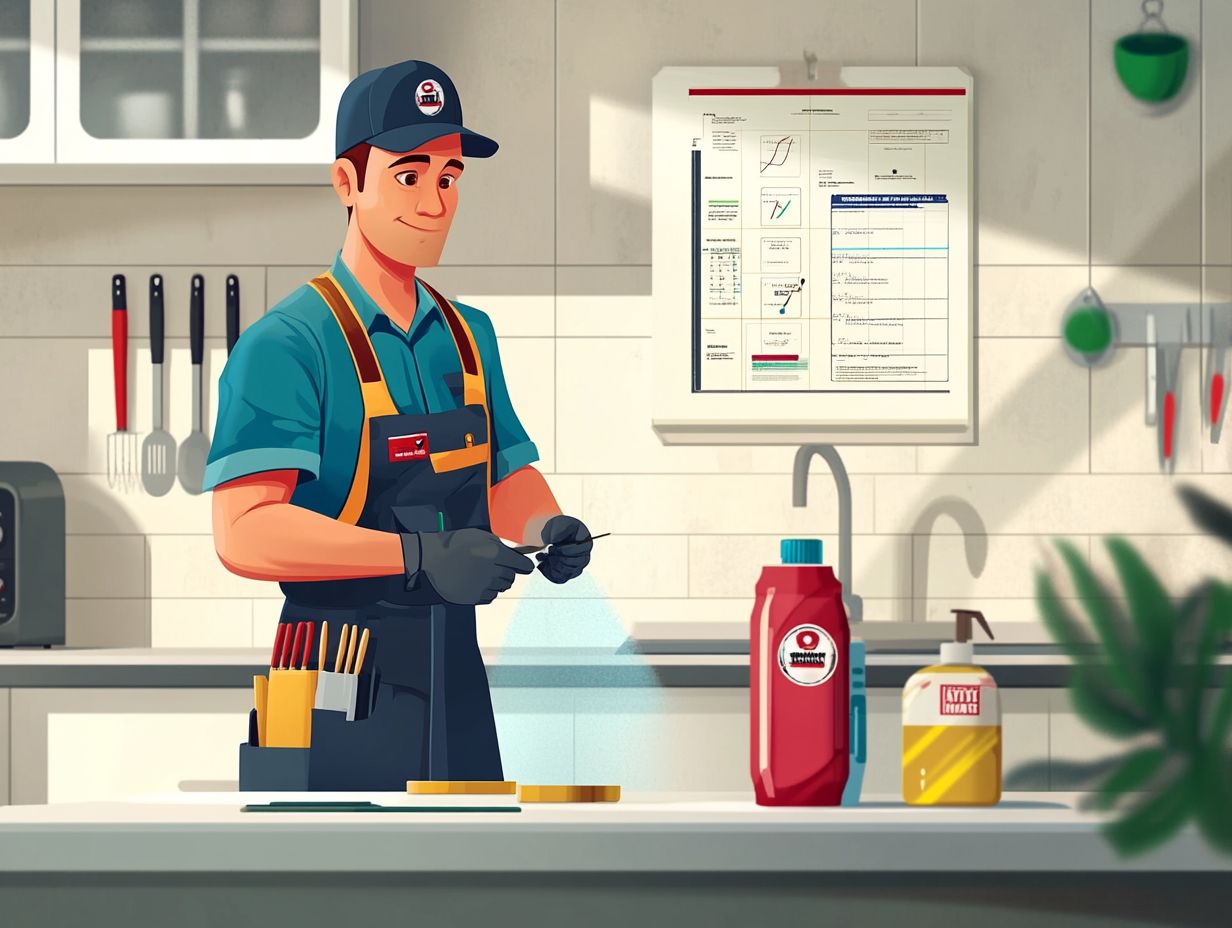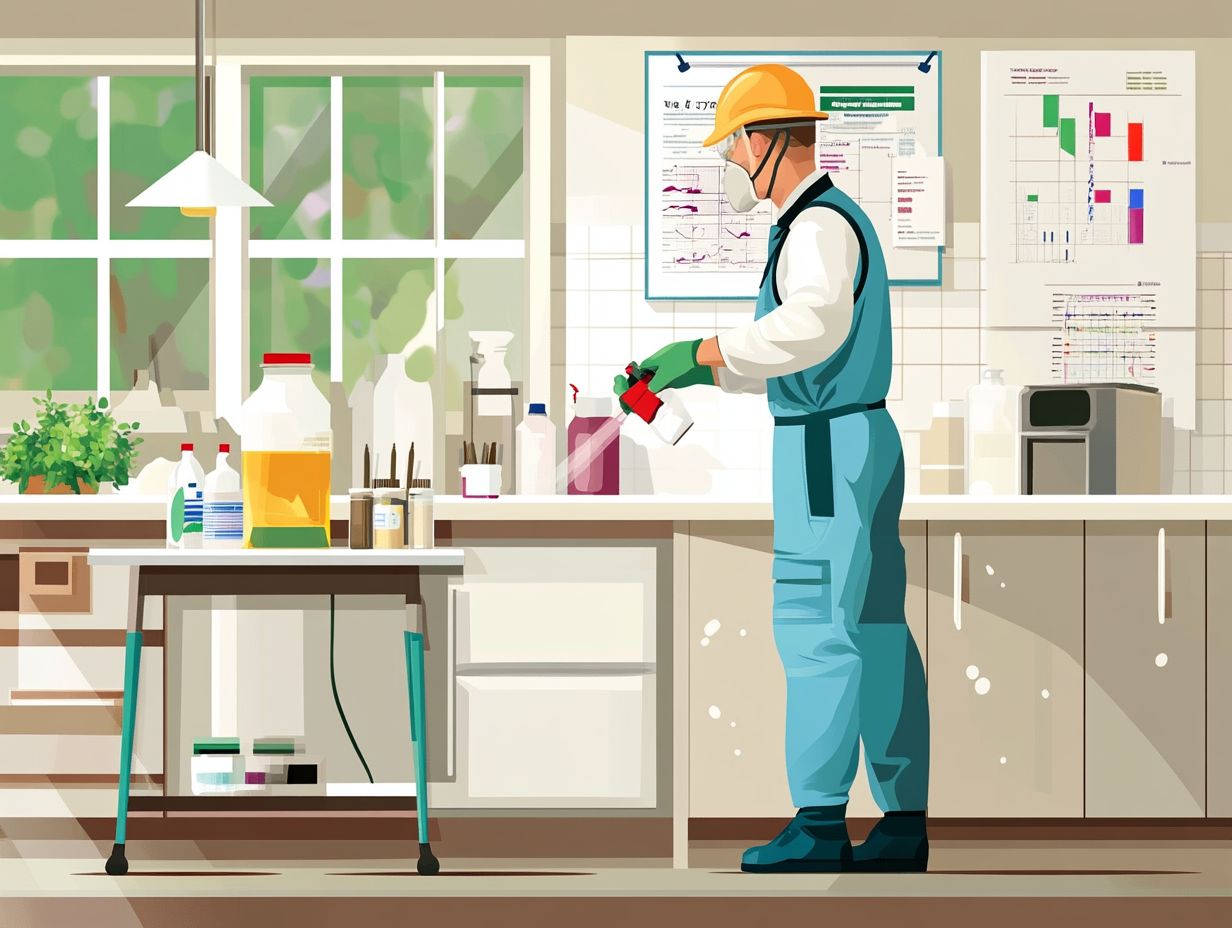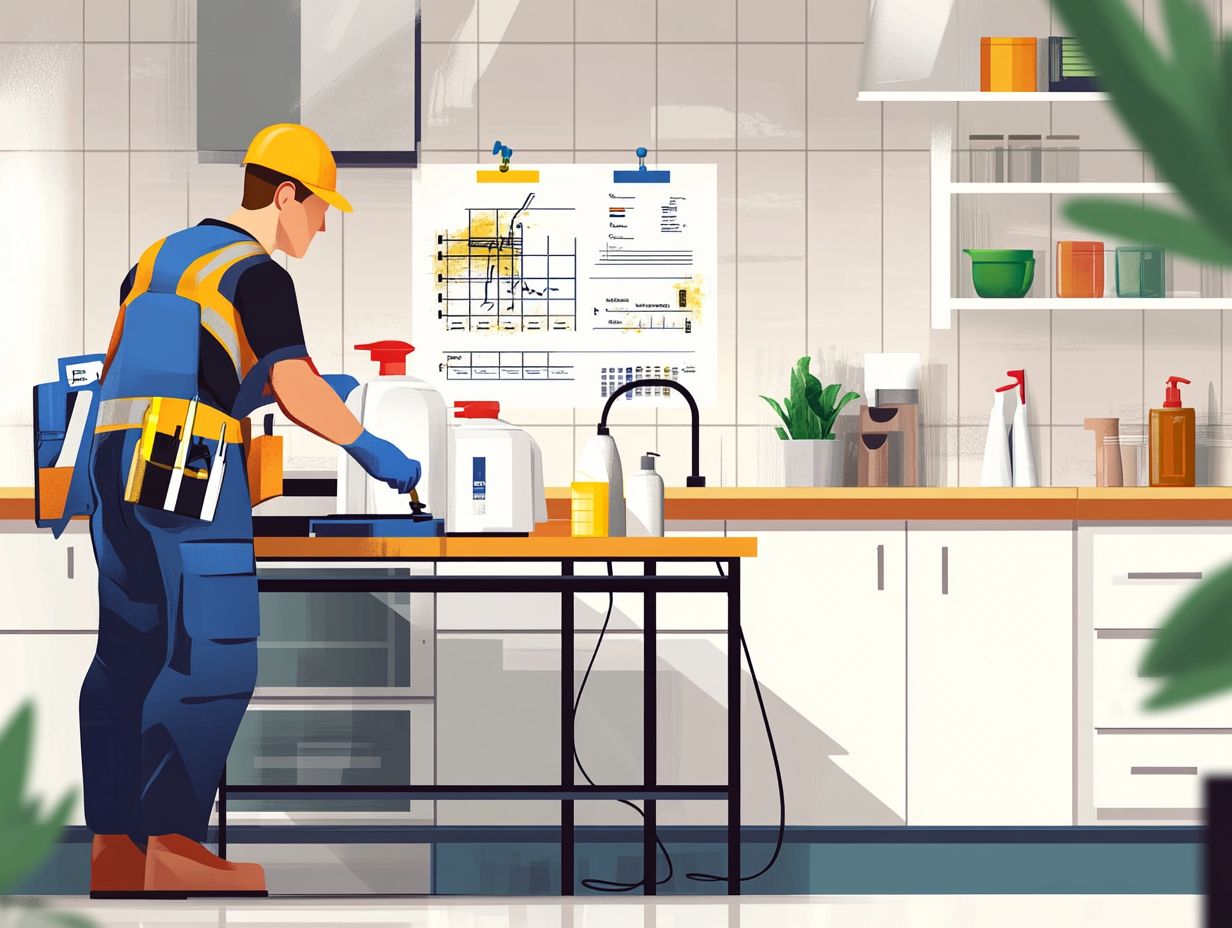In a world where pests can really cause chaos in your home, business, or even your crops, the need for effective pest control services is through the roof.
This article dives into the different types of pest control services you might encounter—residential, commercial, agricultural, and industrial—each one designed to tackle specific needs.
You’ll get a helpful rundown on the essential steps to kickstart your own pest control business, along with some tried-and-true strategies to make it a success.
Whether you’re an aspiring entrepreneur or just curious about the industry, there’s plenty of valuable insight here for you.
Types of Pest Control Services

Regarding managing those pesky unwanted critters, getting a grip on the different types of pest control services is super important for both homeowners and business owners alike.
You've got a whole range of options, from all-inclusive pest management plans for your home to specialized extermination services that cater to commercial and industrial needs. And don’t forget about agricultural pest control—it’s key to protecting crops, ensuring food security, and keeping things eco-friendly.
By using the right pest prevention, inspection, and treatment methods, you can create a pest-free zone that feels just right.
1. Residential Pest Control
Residential pest control is key to keeping your home safe and healthy. It helps tackle common household pests like rodents, insects, and termites that can create real problems for you and your family.
You might not be aware of all the residential pest control services out there that can effectively get rid of these nuisances. Many of these services use a mix of treatment methods, such as targeted sprays, traps, and baiting systems, specifically designed to handle infestations while being gentle on the environment.
It's super important to take proactive pest prevention steps—like sealing up entry points, decluttering your space, and managing waste—to keep those unwanted invaders at bay. Regular pest inspections are also crucial for spotting potential issues before they blow up, allowing you to intervene before things get out of hand.
You can also team up these professional services with your own DIY pest control solutions and products made for home use, making it easier than ever for you to maintain a pest-free sanctuary.
2. Commercial Pest Control
Commercial pest control is crucial for keeping your business environment pest-free, whether you run a restaurant or a warehouse. After all, how you manage pests can really affect your operations and your customers' satisfaction.
To effectively tackle infestations, you’ll need strategies tailored to your specific industry standards and regulations. This means regular inspections and using eco-friendly products, which not only protect your property but also boost the overall safety and reputation of your business.
It's important for you to prioritize service agreements with pest control professionals. This ensures you stay vigilant and compliant with local pest control regulations. These agreements enable you to deal with potential threats proactively, cutting down the risk of costly disruptions and bad experiences for your customers.
In the end, a solid pest management plan is essential for the long-term growth and sustainability of any commercial venture you’re involved in.
3. Agricultural Pest Control
Agricultural pest control is key for you to protect your crops and maintain sustainable farming practices. It requires a solid understanding of pest biology, ecology, and effective pest risk assessment techniques.
As a farmer, you face a range of unique challenges, from adapting to changing pest populations and climate variability to balancing economic viability with ecological integrity. That’s where implementing integrated pest management (IPM) strategies comes in handy. These approaches blend biological, cultural, mechanical, and chemical methods to tackle pest issues in a more holistic way.
By promoting natural predators, using crop rotation, and selecting resistant varieties, you can cut down on your reliance on chemical pesticides. This smart combination not only boosts the effectiveness of your pest control but also reduces the ecological impact of your farming activities, helping to create a healthier ecosystem that supports both biodiversity and crop yield.
4. Industrial Pest Control
Industrial pest control is all about specialized practices that help you protect large facilities and manufacturing plants from pesky infestations that can mess with your operations and create safety hazards.
These practices are specifically designed to fit the unique needs of various industrial settings, where pest-related issues can really disrupt productivity and affect employee health. To tackle these challenges effectively, you’ll often find facilities using a mix of advanced tools and techniques, like integrated pest management systems. Adding in pest control automation technologies lets you monitor things more precisely and respond quickly, which means less downtime and better compliance with safety regulations.
By taking a proactive approach, you can not only protect your assets but also create a healthier working environment for your team.
How to Start a Pest Control Business
Starting a pest control business can be pretty rewarding, especially with a steady stream of clients looking for effective pest management solutions. To successfully launch your business, you'll want to create a solid business plan that outlines your goals, identifies your target market, and details the services you plan to offer.
It’s also crucial to understand the pest control licensing requirements and explore any franchise opportunities that could help you get started on the right foot. Plus, don’t underestimate the power of effective marketing. Using digital marketing strategies will not only help you attract customers but also build a reputable brand in the industry.
1. Research and Develop a Business Plan

Researching and developing a comprehensive pest control business plan is the first crucial step for you as you establish your business. This process will help you understand the market landscape, define your services, and set competitive pricing.
To really succeed in this endeavor, you need to dive into effective market research techniques. Start by identifying your target customers—are they homeowners, businesses, or property managers? This will help you tailor your marketing strategies. Understanding their specific needs and expectations is key to developing a range of pest control services that truly meet their demands.
Don't forget to analyze your competitors, too. Take a look at their pricing strategies, service quality, and customer feedback to spot any gaps in the market. This information will guide you in setting reasonable pricing, ensuring your services are both attractive and profitable.
2. Obtain Necessary Licenses and Certifications
Getting the necessary licenses and certifications is essential for running a legitimate pest control business. This not only helps you stay compliant with local regulations but also meets industry standards.
To kick things off, you’ll want to dive into the specific requirements set by your state or region. As a pest control professional, you’ll need to complete formal training to get the lowdown on safe pesticide application, environmental protection, and public health issues. In many areas, you’ll have to pass a standardized exam, and some places might even throw in background checks as part of the deal.
Once you’ve got those licenses in hand, keeping them up-to-date usually involves regular continuing education. This helps you stay on top of new technologies, pest management strategies, and any regulatory changes.
Plus, you’ll often need to get liability insurance and stick to strict record-keeping protocols. All of this emphasizes how crucial it is to maintain comprehensive compliance, which not only builds trust with your clients but also ensures safety in the community.
3. Purchase Equipment and Supplies
Purchasing the right equipment and supplies is crucial for running a successful pest control operation. It enables you to deliver effective services and meet your customers' needs efficiently.
When you choose high-quality pest control tools and products, you enable your technicians to tackle a variety of infestations, whether they're dealing with rodents, insects, or other pesky nuisances. Essential items like sprayers, traps, foggers, and safety gear are the backbone of your pest control toolkit, allowing for precise treatments while keeping your team safe.
Don’t overlook automation technologies, like software for scheduling and tracking service requests. These tools can streamline your operations and help you respond faster to customer needs. By integrating these innovations, you boost productivity, which can lead to happier customers—making it even more important to invest wisely in your pest management resources.
4. Hire and Train Employees
Hiring and training skilled employees is a big deal in the pest control industry. After all, they’re the face of your business and are responsible for delivering top-notch service to your customers.
To keep those high standards, your hiring process should focus on more than just technical skills; you also want to consider interpersonal abilities since these folks will be interacting with homeowners and businesses on a regular basis. When they go through comprehensive training that emphasizes effective communication, problem-solving, and customer service techniques, operational efficiency really gets a boost.
By making sure your staff gets the right pest control certifications, you can enhance your business's credibility and show your commitment to safety and environmental responsibility. This way, the training process not only creates knowledgeable technicians but also builds community members who understand the importance of earning trust through exceptional service.
5. Market and Advertise Your Business
Effective marketing and advertising strategies are key for attracting customers to your pest control business and establishing a strong presence in your target market.
In today’s competitive landscape, using a variety of tactics can really amp up your customer acquisition and improve your brand’s reputation. Digital marketing techniques, like targeted social media ads, can help you reach specific demographics, while local SEO practices ensure that your business pops up prominently in search results when potential customers are searching for pest control services in their area.
Building positive online reviews is also crucial for building trust and credibility. Many potential clients look to the experiences of others before making a decision, so it’s important for you to actively manage your online reputation and encourage satisfied customers to share their feedback.
Strategies for Running a Successful Pest Control Business
Running a successful pest control business means taking a well-rounded approach that puts customer satisfaction front and center. You’ll want to focus on delivering top-notch service quality and keeping an eye on your competition to stay ahead in the game.
1. Provide Excellent Customer Service

Providing excellent customer service is really at the heart of any successful pest control business. It helps you build positive relationships with clients, which enhances their satisfaction and boosts your reputation.
In this industry, effective communication is key. It not only informs your clients about the services you offer but also sets the tone for the entire interaction. When you respond promptly to inquiries, it shows clients that you value their concerns, which can lead to higher levels of trust. Managing your pest control company’s reputation by actively engaging with reviews can bring in a wave of positive feedback online.
This kind of digital word-of-mouth is huge for attracting new customers and keeping your current ones happy. It ultimately creates a cycle of excellent service that benefits both you and your clients.
2. Stay Up-to-Date on Industry Developments
Staying up-to-date on industry developments is crucial for you as a pest control business owner. It helps you adapt to pest control trends, innovations, and technology changes that can really enhance your service delivery.
By embracing a culture of continuous learning, you can better leverage emerging technologies, like advanced monitoring systems and eco-friendly pest management solutions. This proactive approach not only boosts your operational efficiency but also keeps your customers happier.
Keeping an eye on performance metrics is key; it lets you assess how effective your strategies are, ensuring your services not only work well but also meet the ever-changing expectations of your clients.
Ultimately, being informed about the latest advancements in pest control enables you to stay competitive and relevant in a market that's always evolving.
3. Offer a Variety of Services
Offering a variety of pest control services can really set your business apart from the competition. It allows you to cater to different customer needs and enhances your reputation in the market.
This approach doesn’t just help you attract a broader clientele; it also positions your business as a one-stop solution for all sorts of pest-related issues. By providing a range of pest treatment options—like targeted treatments and preventive measures—you give customers the tailored solutions they’re looking for to address their specific concerns.
And let’s not forget about seasonal pest control services! Adjusting your strategies to match changing environmental conditions ensures you’re effectively managing pests throughout the year. Plus, implementing integrated pest management strategies can take your offerings to the next level by combining biological, cultural, and chemical tactics for long-term pest control success—all while being responsible about it.
4. Utilize Digital Marketing
Utilizing digital marketing strategies is essential for expanding your pest control business's online presence, helping you effectively reach potential customers and drive customer acquisition.
In today’s competitive landscape, mastering different digital marketing techniques can really help your pest control company stand out from the crowd. By implementing search engine optimization (SEO) specifically tailored for the pest control niche, you can rank higher on search engines, attracting quality leads to your business.
A strong social media marketing approach can foster engagement and build trust within the community. When you combine these efforts with targeted online advertising strategies, you create a powerful synergy that resonates with homeowners looking for pest solutions.
Ultimately, having a well-rounded digital marketing strategy not only boosts your visibility but also strengthens your brand's reputation, making it absolutely essential for your success.
5. Establish Partnerships and Referral Programs
Establishing partnerships and referral programs can seriously give your pest control business a lift. It enhances customer retention and helps you create a network of happy clients who will happily spread the word about your services.
Networking is key here; building strong relationships in the community will boost your visibility and trustworthiness. By getting involved in community outreach initiatives, you can connect with local organizations and businesses, creating a collaborative vibe that benefits everyone.
These partnerships not only help boost your brand recognition but also encourage good old-fashioned word-of-mouth marketing. When your customers are satisfied, they become your biggest advocates. Their positive experiences can lead to organic growth through referrals.
Implementing a structured referral program allows you to reward your existing customers for their endorsements. This creates a cycle of customer satisfaction that drives new leads and strengthens their loyalty to your business.
Frequently Asked Questions
What is a pest control business?

A pest control business is a company that provides services to eliminate or manage pests, such as insects, rodents, and other unwanted animals, from residential and commercial properties.
What is the role of a pest control business?
The main role of a pest control business is to identify and eliminate pest infestations, as well as implement strategies to prevent future infestations. They may also provide advice on how to maintain a pest-free environment.
What are some common pest control strategies?
Some common pest control strategies include using pesticides, traps, and baits to eliminate pests. Other strategies may include sealing entry points, removing food and water sources, and implementing proper sanitation practices.
How can a pest control business benefit a residential or commercial property?
A pest control business can benefit a property by eliminating and preventing pest infestations, which can cause damage to the property and pose health risks. This can also help maintain a clean and safe environment for residents or employees.
What are some important factors to consider when starting a pest control business?
Some important factors to consider when starting a pest control business include obtaining proper licenses and permits, having a solid business plan, acquiring necessary equipment and supplies, and staying up-to-date on industry regulations and advancements.
Are there any eco-friendly pest control options available?
Yes, there are eco-friendly pest control options available, such as using natural ingredients and non-toxic methods to eliminate and prevent pests. These options can be beneficial for those who want to minimize the use of chemicals and reduce their impact on the environment.

